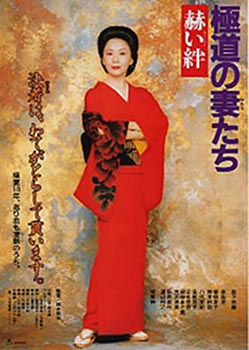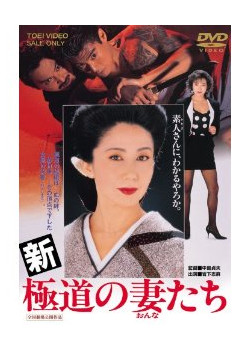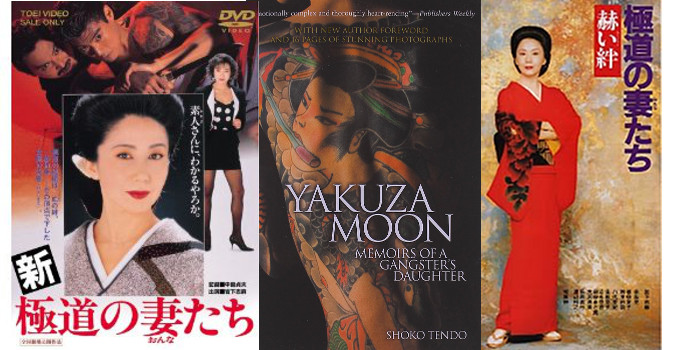Born and raised in Tokyo, Rie Alkemade holds a masters degree in Global Criminology from Utrecht University in the Netherlands. Interested in the phenomenon of organized crime, she decided to focus on the topic of women in the yakuza – a subject about which little has been formally studied. Being fully bilingual, she herself conducted and translated interviews for her masters thesis ‘Outsiders Amongst Outsiders’: A Cultural Criminological Perspective on the Sub-Subcultural World of Women in the Yakuza Underworld”.
The following has been excerpted from her work, which can be read in its entirety here.
…Unlike Western mafia wives, yakuza wives have remained outside the sphere of criminal activity in this organized crime structure, remaining in the passive emotionally and financially supportive role. This research further explores the ways in which these women have adapted to their set circumstances by creating a parallel shadow subculture, an exclusively female ‘sub-subculture’ within the yakuza itself in which they create a sense of solidarity, pride, and confident identities by adopting and mimicking the yakuza rituals and customs as their own.
The “myth” of the onna-oyabun
There appears to be in the modern age amongst the members of mainstream Japanese society a belief in the ‘myth’ of the onna-oyabun or the ‘female godmother’ in the yakuza underworld. A general lack of media coverage on this ‘phenomenon’ and an attraction for popular media to portray such onna-oyabuns (namely The Yakuza Wives series in Japan and the character of O-ren Ishii in Kill Bill: Vol. 1 internationally) have caused many to wonder whether such female bosses truly exist in the yakuza society or whether they are fictive creations and fabrications of popular culture.
Further reading on this subject would reveal that there have indeed been real cases of women who can be described as onna-oyabuns. Though rare today, they were not unheard of in history. Back in the feudal times of the Edo era where gambling was the primary activity of the yakuza’s ance stors, female gamblers were a common sight and therefore there was a greater possibility for a woman to take control of her own crew of gamblers. In the years before and after World War II, documented cases can be found on the “many female delinquents, female gurentai, and female yakuza” with famous female oyabuns ruling in the areas of Yokohama and Tokyo. However as times have changed and the yakuza itself has changed, modern researchers have generally come to the conclusion that these numbers have waned, painting an entirely different picture in the world of today: “These women were clearly integrated into the structure of a crime ‘syndicate’ and more than once engaged in the ritual of the exchange of cups of sake that sealed their ties of vassalage. Today, these rituals are no longer used. And there was no longer female gang leaders”. Similarly, an interview with an anonymous (male) oyabun reveals that “[there] probably aren’t any onna-oyabuns today. It’s probably just in the world of films. There used to be some before, though. […] There were quite a few female gamblers”.
stors, female gamblers were a common sight and therefore there was a greater possibility for a woman to take control of her own crew of gamblers. In the years before and after World War II, documented cases can be found on the “many female delinquents, female gurentai, and female yakuza” with famous female oyabuns ruling in the areas of Yokohama and Tokyo. However as times have changed and the yakuza itself has changed, modern researchers have generally come to the conclusion that these numbers have waned, painting an entirely different picture in the world of today: “These women were clearly integrated into the structure of a crime ‘syndicate’ and more than once engaged in the ritual of the exchange of cups of sake that sealed their ties of vassalage. Today, these rituals are no longer used. And there was no longer female gang leaders”. Similarly, an interview with an anonymous (male) oyabun reveals that “[there] probably aren’t any onna-oyabuns today. It’s probably just in the world of films. There used to be some before, though. […] There were quite a few female gamblers”.
Yet this complete and absolute dismissal of their existence may perhaps be a bit too hasty. A retired marubo police officer in Tokyo shared with me his personal experience with a female ‘godmother’:
I: Is it true that there are few to none female yakuza members?
R: You don’t see them often. Well, actually almost never. But once while I was still working as a police officer, I did meet a female boss. […]
I: In Tokyo?
R: Yes, she was the boss of a tekiya group. She’s passed away now, but I did meet her long ago.
I: What kind of woman was she?
R: Well. She was just an ordinary old lady. Her group wasn’t very big. About 10 people maybe? It was originally her husband’s group, but then her husband passed away and she took over. […] I’d been in the police force for a long time [roughly 40 years] but in the end, no matter how long you search there’s hardly any female bosses. Maybe just a handful…
Official research into this field, for reasons mentioned in the previous chapter, has been little to non-existent; statistics and official reported figures in this area as another retired marubo officer had explained are scarce:
“We haven’t really conducted any research on this so we can’t say there aren’t any with certainty. There used to be official female members in the past, but today there’s no statistics on the subject. From what I’ve heard, there used to be some female yakuza bosses during the 1940s to 1950s… so about 60 years ago. But I would say that the number of female members is probably close to zero.”
Gokutsuma
Little empirical and academic information has been gathered about women married to yakuza members. There appears to be a fascination surrounding these women as many from the mainstream society wonder what kind of women would enter a relationship with an ‘undesirable’ man such as a yakuza member. In the reportage compilation, Gokudo no Onna-tachi (The Yakuza Wives), author Shoko Ieda who had spent several months living with and interviewing such women states the following:
“‘What kind of woman marries a yakuza?’ I often get asked these kinds of questions. Every time, I answer: ‘Anyone.’ Many of these women have said to me, ‘It just so happened that the person I fell in love with turned out to be a yakuza’.”
The number of academic research conducted on how these women meet men from the yakuza underworld are close to none. As encountering and marrying a yakuza member in itself is not against the law, the police have no reason to prioritize or finance such research or gather statistics in this field. Therefore most of the knowledge needed must be taken from autobiographical and biographical accounts and anecdotes from those familiar with or have encountered the yakuza society.
 Accounts and opinions on this matter seem to split. Some believe that there is a clear, consistent pattern and notable similarities on how these women meet their yakuza husbands, and thus there exist similarities in their backgrounds and personality traits as well. In the case of adolescent girls, some of the respondents have noted that these girls are often juveniles themselves, having come from troubled homes or disadvantaged backgrounds. This standpoint is can be seen from this excerpt from Respondent 1, a criminology professor and former researcher for the NRIPS:
Accounts and opinions on this matter seem to split. Some believe that there is a clear, consistent pattern and notable similarities on how these women meet their yakuza husbands, and thus there exist similarities in their backgrounds and personality traits as well. In the case of adolescent girls, some of the respondents have noted that these girls are often juveniles themselves, having come from troubled homes or disadvantaged backgrounds. This standpoint is can be seen from this excerpt from Respondent 1, a criminology professor and former researcher for the NRIPS:
“A very common pattern is that juvenile girls often go to hang out in town […] and they meet other juveniles or yakuza members and they have a great time. Juvenile girls often come from stressful home situations, or have issues with their parents, and when they meet yakuza members who also have experienced similar issues, these girls feel a strong sense of connection and feel understood by these men. […] Sometimes these girls know that these men belong to the yakuza; sometimes they don’t. But for these girls being a yakuza isn’t necessarily bad, because they start to think ‘Oh, but he’s so cool.’”
Another respondent, a daughter of a yakuza boss herself, also emphasized this point, saying that many yakuza wives used to be delinquents or yanki (a Japanese slang word for delinquents or troublemakers) in their youths as they didn’t grow up in warm or stable home environments. Another one of my respondents familiar with the yakuza underworld (who wishes to stay anonymous) clearly outlined two main patterns as to how the yakuza meet their wives:
“Firstly, the women work in the mizushoubai industry, or the entertainment and ‘nightlife’ industry. They may work in bars, late-night restaurants or as hostesses. The men often show off their wealth to impress these women. […] This pattern usually is the case for higher-ranking members or the bosses, who have the money to spend.
The second pattern is where the woman and yakuza member have known each other since their youth or adolescence and have grown as juveniles together. They may have been members of bosozoku gangs [juvenile biker gangs] and naturally form a relationship, where the boy eventually becomes a member of a yakuza group.”
In all of these accounts, the respondents appear to stress the fact that these women were once juveniles themselves, thus explaining how they are able to meet such men: through association. These accounts also stress that these women have also come from disadvantaged backgrounds, forming a common ground with the yakuza….
The entire thesis with citations and references can be read here.

[…] Alkemade. “Women of the Yakuza.” Japan Subculture. 18 Feb. […]
For the record, “juvenile” comes from Latin, and it just means “young”.
It is used here apparently as a shortened form of “juvenile crime” or “juvenile delinquency”, but there should be no bias attached to this word.
Is there a difficulty in a yakuza marrying into families of Caucasian or subafrican
No, love is free.
If you want to be a side piece with cole slaw, mistress. You’re more than welcome lol. First wife gets the first cut, priority, and will most likely be 100% Japanese or Half but Japanese no less. Go stick with your own people. Stop fantasizing over someone’s else’s culture. FYI you have never be a Native American and will never be one just a imposter liar 5 dollar Indian. Not being racist but straight up! Be you and we will be who we are. Period!
I believe the last piece of your comment is completely unrelevant to Kia’s question. Nobody asked for your opinion on wheter subafrican people are native american or not, and I think that calling her “an imposter liar 5 dollar Indian” IS straight up racist, as well as really offensive. And FYI, commas are a thing. Go use them. Period.
No, no. Pride is right. That woman is trying to insert herself into a fantasy.
Didn’t seem like it. The question was simply if Yakuza had difficulty marrying into other backgrounds. Not that she was personally interested, who actually wants to marry someone in organized crime?
However speaking of organized crime, in a lot of other situations there is a trend of arranged marriages to stay within the right families and bloodlines. But based on what is described in this article, that isn’t the case. It’s more of who they meet in certain circumstances. So the question of if ethnic purity is just as strict compared to other organized crime, is a fair and interesting question.
Especially since Japan is a pretty homogeneous society so mixed race people are often discriminated, and the Yakuza are typically made of those who are considered the lowest class or most undesirable. And there are examples of Yakuza working with mixed race people, so it isn’t all together completely obscured in my opinion.
[…] http://www.japansubculture.com/wives-of-the-yakuza/ https://el.wikipedia.org/wiki/%CE%93%CE%B9%CE%B1%CE%BA%CE%BF%CF%8D%CE%B6%CE%B1 […]
[…] care work in hijacked vessels and invest in piracy operations. In line with existing work on Japanese organised crime, I have found that even when membership is not formally recognised, the boss’s wife ensures […]
[…] care work in hijacked vessels and invest in piracy operations. In line with existing work on Japanese organised crime, I have found that even when membership is not formally recognised, the boss’s wife ensures […]